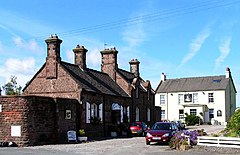Drigg
| Drigg | |
|---|---|
 Drigg railway station and the Victoria Inn |
|
| Drigg shown within Cumbria | |
| Population | 449 (2011) |
| OS grid reference | SD064990 |
| Civil parish | |
| District | |
| Shire county | |
| Region | |
| Country | England |
| Sovereign state | United Kingdom |
| Post town | HOLMROOK |
| Postcode district | CA19 |
| Dialling code | 019467 |
| Police | Cumbria |
| Fire | Cumbria |
| Ambulance | North West |
| EU Parliament | North West England |
| UK Parliament | |
Drigg is a village situated in the civil parish of Drigg and Carleton on the West Cumbria coast of the Irish Sea and on the boundary of the Lake District National Park in the Borough of Copeland in the county of Cumbria, England.
Drigg and Carleton parish comprises the areas and settlements of Drigg, Stubble Green, Low Moor, Carleton, Saltcoats, Maudsyke, Wray Head, Hallsenna, Holmrook. The civil parish population at the 2011 census was 449.
Drigg sits to the north of the River Irt, with Carleton to the south of the river. The river runs from Wastwater lake to the Irish Sea. There are three bridges over the river in the parish; the main bridge is in Holmrook which takes the A595 road over the river. The Cumbrian Coast Line railway crosses the River Irt at the head of the tidal estuary where the Irt joins the River Mite at Ravenglass. There is an old small packhorse bridge in the Drigg Holmes which does not take vehicles.
Drigg railway station is on the Cumbrian Coast Line.
The parish has a number of areas of natural interest: the sandy beach and dunes, Hallsenna Moor and Drigg Holmes. Part of the dunes are an important bird reserve, a Local Nature Reserve and a Site of Special Scientific Interest.
...
Wikipedia

